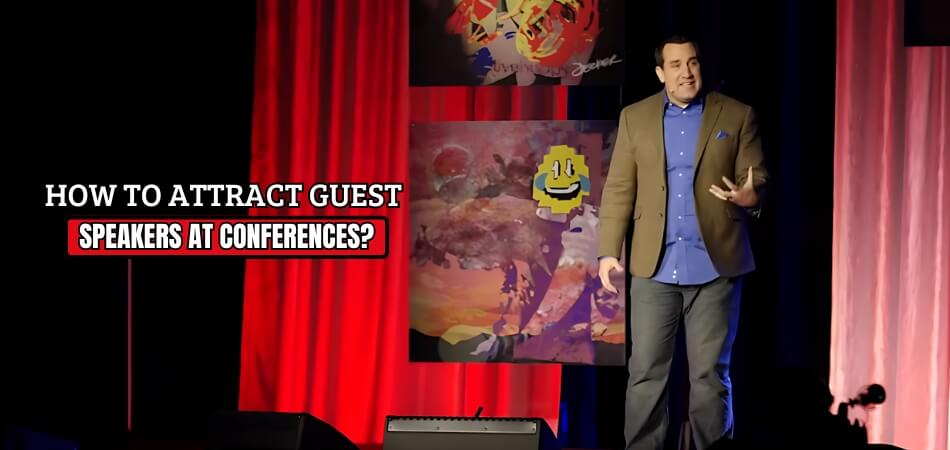Attracting guest speakers can transform your conference into a dynamic hub of ideas and inspiration. The right speaker captivates the audience, ignites discussions, and leaves a lasting impression. But the question remains, how do you attract guest speakers at conferences? Crafting an engaging experience for both speakers and attendees is crucial.
Start by identifying speakers whose expertise aligns with your conference theme. Personalize your outreach with compelling invitations, showcasing the value of their participation. Additionally, consider leveraging industry connections and networks to entice well-known figures to join your event.
Creating a supportive environment that highlights the benefits for speakers will significantly boost your chances of securing top talent. Curious to learn more about attracting guest speakers? Read on to discover effective strategies that can upgrade your conference experience.
Why Are Guest Speakers Essential for Conference Success?
Guest speakers are vital to the success of any conference, bringing unique perspectives and insights that improve the overall experience. Their expertise not only attracts attendees but also promotes a vibrant atmosphere for learning and networking. Here are some reasons why guest speakers are essential for conference success.

Expert Knowledge and Insights
Guest speakers bring a wealth of knowledge from their respective fields. Their experiences and insights provide attendees with fresh ideas and practical solutions to real-world problems. This exchange of knowledge often inspires attendees to think creatively and implement new strategies in their own work.
Networking Opportunities
A well-chosen guest speaker can attract a larger audience, creating more opportunities for networking. Participants can engage in meaningful conversations, share experiences, and build valuable connections. In larger events, such as conferences in Canada, these interactions often lead to collaborations and partnerships that extend beyond the conference, benefiting professionals across various industries.
Improved Credibility
Having recognized experts as speakers adds credibility to your conference. Attendees are more likely to trust the content and value of the event when reputable figures are involved. This credibility can also improve the conference’s reputation, making it more attractive for future attendees and speakers alike.
Diverse Perspectives
Guest speakers often come from varied backgrounds, bringing diverse viewpoints to the table. This diversity encourages rich discussions and broadens attendees’ knowledge of complex topics. It also fosters an inclusive environment where multiple perspectives are valued.
Inspiration and Motivation
A passionate speaker can motivate attendees to take action and pursue their goals. Their stories of overcoming challenges can resonate deeply, encouraging participants to push through obstacles in their own lives. This inspiration often lingers long after the conference ends.
So, guest speakers are a key ingredient in creating a successful conference experience. By enhancing knowledge, networking, and engagement, they contribute significantly to the overall value of the event.
How Do You Attract Guest Speakers at Conferences?
Attracting guest speakers to your conference is essential for creating an engaging and memorable event. The right speakers not only bring valuable insights but also upgrade the overall experience for attendees. Here are some effective strategies to help you secure quality guest speakers for your conference.
Step 1: Define Your Conference Goals
Before reaching out to potential speakers, clarify your conference objectives. Are you aiming to educate, inspire, or spark discussions? A clear vision will help you identify the right speakers whose expertise aligns with your goals, making your event more cohesive and impactful.
Step 2: Identify Target Audiences
Knowing your audience is crucial when attracting guest speakers. Consider their interests, demographics, and what they hope to gain from the conference. Tailoring your speaker selections to resonate with your audience ensures that your event will be engaging and relevant, increasing the likelihood of a successful turnout.
Step 3: Leverage Your Network
Utilize your professional network to find potential speakers. Reach out to colleagues, industry associations, or social media connections for recommendations.
Personal referrals can add credibility and increase the chances of securing high-profile speakers who may be more willing to participate, especially if they are passionate about attending a conference to guest speak and share valuable insights.
Step 4: Craft Personalized Invitations
When approaching potential speakers, personalized invitations go a long way. Highlight their achievements and explain why their participation is valuable for your event. A thoughtful, tailored approach demonstrates your genuine interest in their expertise and can significantly enhance your chances of a positive response.
Step 5: Showcase Value for Speakers
Articulate the benefits of speaking at your conference, not just for attendees but for the speakers themselves. This could include networking opportunities, exposure to new audiences, or even compensation. When speakers see the potential for personal or professional gain, they are more likely to consider your invitation seriously.
Step 6: Utilize Social Media
Harness the power of social media to attract speakers. Share engaging content related to your conference theme and tag potential speakers. This not only piques their interest but also demonstrates the excitement and engagement of your audience, making it more appealing for them to join.
Step 7: Offer Flexible Formats
Flexibility in speaking formats can attract more speakers. Consider offering options such as keynote speeches, panel discussions, or workshops. This variety allows speakers to choose the format that best suits their style and expertise, making your event more attractive.
Step 8: Create an Inclusive Environment
Ensure that your conference fosters an inclusive and welcoming atmosphere. Highlight your commitment to diversity and representation in your speaker lineup. A supportive environment encourages speakers to share their insights and experiences, enriching the event for everyone involved.
So, attracting guest speakers requires a strategic approach that emphasizes collaboration, value, and engagement. By implementing these strategies, you can enhance your conference’s appeal and create an unforgettable experience for both speakers and attendees. With the right speakers on board, your event will undoubtedly grow.
Identify the Right Guest Speaker for Your Conference
Choosing the right guest speaker for your conference is crucial to its success. A well-chosen speaker not only engages the audience but also adds immense value to the event. Here are key considerations to help you identify the perfect guest speaker.
Align with Conference Goals
Ensure the speaker’s expertise aligns with your conference theme and objectives. A speaker who understands the event’s purpose can tailor their presentation to meet your audience’s needs. This alignment creates a cohesive experience that resonates with attendees and reinforces your conference message.
Review Experience and Credentials
Look for speakers with relevant industry experience and proven track records. Their credentials should reflect their expertise, whether through publications, previous speaking engagements, or accolades. A seasoned speaker brings credibility, enhancing the audience’s trust in their insights.
Consider Audience Appeal
Identifying speakers who can connect with your specific audience demographic is essential. Consider their speaking style, personality, and ability to engage attendees.
Additionally, writing a formal guest speaker invitation that highlights their value and significance can further encourage their participation. A speaker who resonates with your audience can make complex topics more relatable and inspire meaningful discussions.
Assess Availability and Flexibility
Before finalizing a speaker, confirm their availability and willingness to adapt to your event’s schedule. Flexibility is essential, especially if you have a unique format or specific timing requirements. Ensuring they can accommodate your needs will facilitate a smoother planning process.
Seek Recommendations and Reviews
Consult peers or industry professionals for recommendations and insights about potential speakers. Reviews and testimonials can provide valuable information about a speaker’s effectiveness and audience engagement. Gathering feedback from others can guide your selection and ensure a successful experience.
So, identifying the right guest speaker is a strategic process that pays off in engaging your audience. Taking the time to consider these factors will lead to a memorable conference experience for everyone involved.
How to Build Relationships With Potential Speakers?
Building relationships with potential speakers for an event involves strategic communication and rapport-building. By employing various tactics, you can establish trust and interest, enhancing the likelihood of securing their participation.
Research and Personalize
Begin by researching potential speakers thoroughly. Tailor your outreach to demonstrate a genuine understanding of their expertise and how it aligns with your event’s objectives. Personalized messages show you value their unique contributions.
Cultivate Mutual Benefits
Highlight the benefits of speaking at your event not only for your audience but also for the speaker. Emphasize opportunities for networking, exposure, and professional development. Mutual benefits promote a sense of partnership and investment.
Leverage Existing Connections
Utilize your network to connect with potential speakers through mutual contacts or introductions. Referrals from trusted sources can significantly increase your credibility and the likelihood of a positive response. Leverage existing relationships to facilitate warm introductions.
Provide Value First
Offer something of value to the potential speaker before making any requests. This could include sharing relevant resources, inviting them to participate in discussions or panels, or promoting their work. Demonstrating goodwill builds reciprocity and goodwill.
Maintain Genuine Communication
Keep your communication authentic and transparent throughout the relationship-building process. Avoid generic or spam messages, and instead, engage in meaningful conversations. Show genuine interest in the speaker’s work and contributions.
What Types of Questions You Should Ask to Guest Speakers?
Inviting guest speakers to your event opens the door to insightful discussions and valuable knowledge sharing. To make the most of their expertise, it’s essential to ask the right questions that stimulate engagement and encourage meaningful discussion. Here are some types of questions to consider.
Personal Journey and Inspiration
Begin by asking speakers about their journey in their field. Questions like, “What inspired you to pursue your career?” can reveal personal anecdotes that resonate with the audience. Such stories often create a relatable connection and set a warm tone for the discussion.
Industry Insights and Trends
Inquire about current trends and challenges in their industry. For instance, “What do you see as the most significant changes impacting your field?” This allows speakers to share their insights and expertise while providing the audience with a fresh perspective on relevant topics.
Practical Advice for Attendees
Request actionable advice that the audience can implement in their own careers. Questions such as, “What is one piece of advice you wish you had received when starting out?” encourage speakers to provide guidance that can help attendees mange their professional paths more effectively.
These are some of the best questions to ask a guest speaker to ensure the conversation is both informative and engaging.
Future Predictions
Ask speakers to share their thoughts on the future of their industry. A question like, “Where do you see the industry heading in the next five years?” can lead to engaging discussions about upcoming opportunities and potential challenges that the audience should be aware of.
Personal Experiences with Failure
Encourage vulnerability by asking about their experiences with failure. Questions like, “Can you share a time when you faced a significant setback?” allow speakers to discuss resilience and lessons learned, which can inspire attendees to overcome their challenges.
Asking the right questions not only enriches the conversation but also provides valuable takeaways for your audience. By engaging guest speakers thoughtfully, you create a more memorable and impactful experience for everyone involved.
Frequently Asked Questions
Attracting guest speakers can significantly enhance the value of your conference, but it often raises many questions. Knowing these issues can help you create a more appealing and effective event. Here are some frequently asked questions about how to attract guest speakers at conferences.
Can I Offer Compensation to Guest Speakers?
Yes, offering compensation can be a significant incentive for guest speakers. Many professionals appreciate being compensated for their time and expertise, which can range from speaking fees to covering travel expenses.
By providing financial support, you demonstrate the value you place on their contribution and increase the likelihood that they will accept your invitation.
Should I Focus on Local Speakers Only?
While local speakers can be easier to attract due to their proximity, broadening your search to include national or international experts can greatly improve your conference’s appeal.
Diverse perspectives can enrich discussions and provide attendees with a wider range of insights. Balancing local talent with external speakers can lead to a more dynamic event.
How Important Is the Speaker’s Online Presence?
A speaker’s online presence can play a vital role in their attractiveness as a guest. If they have a strong following and engage with their audience regularly, it can generate additional interest in your event.
This exposure often translates into greater visibility and credibility for your conference, as attendees may be more inclined to participate if they recognize and respect the speaker.
Is It Beneficial to Provide Speaking Topics in Advance?
Yes, providing potential speaking topics can significantly benefit both the speakers and your audience. When speakers know what themes to focus on, they can relate their presentations to align with the conference’s goals.
This also helps attendees feel more engaged, as they can anticipate relevant discussions that resonate with their interests.
Do I Need to Create a Formal Application Process for Speakers?
Creating a formal application process can be beneficial, especially for larger conferences. It allows you to assess potential speakers systematically and ensure they align with your event’s objectives. A clear application process can also help speakers feel valued and appreciated, increasing their likelihood of participating.
Final Thoughts
Attracting the right guest speakers can truly upgrade your conference, creating an environment rich with knowledge and inspiration. As you reflect on how do you attract guest speakers at conferences, remember that genuine connections and clear communication are key. Building relationships with potential speakers can lead to mutually beneficial opportunities.
By focusing on the unique value each speaker brings, you can adjust your invitations and ensure they feel appreciated. Consider their expertise, audience engagement, and how their presence can enhance the overall experience for attendees.
Ultimately, a well-curated lineup of speakers will leave a lasting impression on your audience. As you implement these strategies, you’ll be well on your way to hosting a memorable event that resonates with everyone involved.







